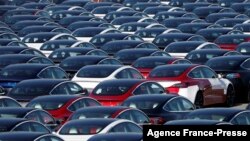Britain could revive domestic production of super strong magnets used in electric vehicles and wind turbines with government support, to cut its reliance on China and achieve vital cuts in carbon emissions, two sources with direct knowledge said.
A government-funded feasibility study is due to be published on Friday, laying out the steps Britain must take to restart output of rare earth permanent magnets, the sources said.
A magnet factory would help Britain, hosting the COP26 U.N. climate talks in Glasgow, Scotland, meet its goal of banning petrol and diesel cars by 2030 and slashing carbon emissions to net zero by 2050.
British production of the magnets vanished in the 1990s when the industry found it could not compete with China. But with the huge growth in demand, the government is keen to secure enough supply.
Last month, the government set out plans to achieve its net zero strategy, which includes spending $1.15 billion to support the roll out of electric vehicles (EVs) and their supply chains.
The study outlines how a plant could be built by 2024 and eventually produce enough of the powerful magnets to supply 1 million EVs a year, the sources who have read the report said.
"We're looking to turn the tide of shipping all this kind of manufacturing to the Far East and resurrect U.K. manufacturing excellence," one of the sources said.
The government's Department for Business declined to comment on details regarding a possible magnet factory because the report has not been released.
"The government continues to work with investors through our Automotive Transformation Fund (ATF) to progress plans to build a globally competitive electric vehicle supply chain in the U.K.," a spokesperson said in an email.
EV ramp up
British rare earth company Less Common Metals put together the feasibility study and is considering seeking partners to jointly build the factory, the sources said.
LCM is one of the only companies outside of China that transforms rare earth raw materials into the special compounds needed to produce permanent magnets.
Automakers will need the magnets as they ramp up EV output in Britain. Ford said last month it would invest up to $310 million in an English plant to produce around 250,000 EV power units a year from mid-2024.
Rare earth magnets made of neodymium are used in 90% of EV motors because they are widely seen as the most efficient way to power them.
Electric cars with these magnets require less battery power than those with ordinary magnets, so vehicles can travel longer distances before recharging.
A race by automakers to ramp up EVs and countries to switch to wind energy is due to boost demand for permanent magnets in Europe as much as tenfold by 2050, according to the European Union.
The sources said government support would be vital so Britain could compete with China, which produces 90% of supply.
The strategy mirrors similar efforts by the EU and the United States to create domestic industries of raw materials, rare earth processing and permanent magnets.





